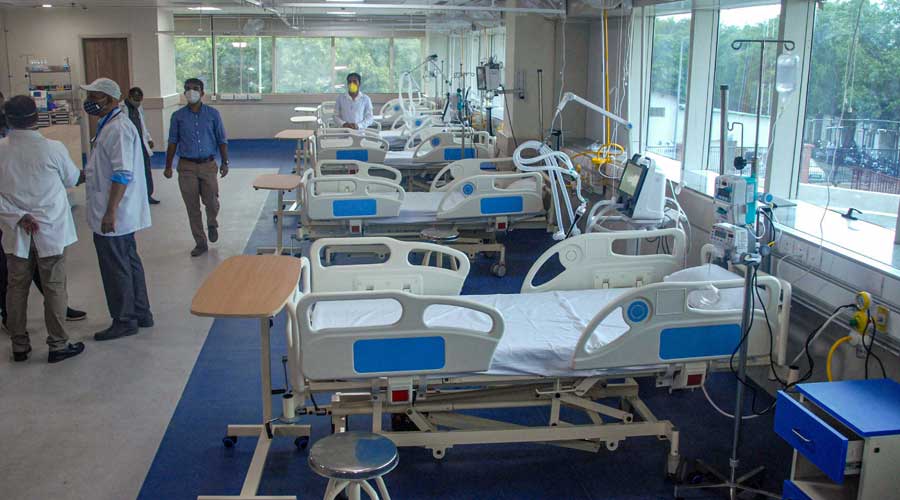Bengal’s regulatory commission has said private healthcare units in the state could during admission demand up to Rs 50,000 — or 20 per cent of the estimated treatment cost — whichever was less.
The West Bengal Clinical Establishment Regulatory Commission issued the related advisory on Saturday.
The private hospitals cannot refuse admission if the patient cannot pay the sum immediately, but the money has to be paid within 12 hours, the advisory said. If a patient fails to pay up within that time, the hospital can ask that the bed be vacated within the hour, it added.
Patients’ rights groups said the decision gave private hospitals the “licence to fleece patients” and refuse treatment to those unable to pay.
Retired judge Ashim Kumar Banerjee, chairperson of the commission, said the amount had been fixed for the benefit of both the patients and the hospitals.
“I have proof that one hospital had sought a deposit of Rs 3 lakh. This had to stop. At the same time, hospitals need to stay viable,” he said.
But Peerless Hospital chief executive Sudipta Mitra said the hospital was asking for Rs 5,000 as deposit from Covid-19 patients during admission. “Now we can ask for Rs 50,000,” he said.
Although the advisory did not mention Covid-19, most people seeking admission at hospitals now are either coronavirus-positive or have Covid-like symptoms.
“After due deliberations and careful consideration, it is decided that clinical establishments would not be entitled to demand more than 20 per cent of the estimated cost of treatment or a maximum amount of Rs 50,000, whichever is less, at the time of admission,” the advisory issued by Arshad Hasan Warsi, secretary to the regulatory commission, said.
The advisory said: “In case the patient party is not in a position to deposit the required amount at the time of admission, the hospital would admit the patient as and by way of provisional admission and give adequate necessary treatment required right at that moment. However, the admission would be regularised upon deposit of the amount within a period of 12 hours.”
The advisory adds: “In case the deposit is not made within the time stipulated above, the hospital would be at liberty to cancel the provisional admission and ask the patient party to take back the patient within one hour thereafter.”
According to the advisory, it had come to the notice of the commission that patient parties “face hardship in fulfilling requirement of advance payment” at the time of admission.
Some of the private hospitals said it had become a headache to secure payment in the case of patients who had died or whose discharge date had arrived without anyone coming to accompany them home.
In a second advisory issued on Saturday, the regulatory commission said: “All investigations amounting above Rs 2,000 should be done on a prior documented intimation to the patient party.”
If an investigation is regularly repeated, it said, the patient's family must be informed and the reason explained.
This advisory was issued because the commission had noticed that costly investigations were being repeated regularly, the commission said.
Patients and organisations campaigning for their rights criticised the decision to allow the hospitals to seek up to Rs 50,000 as deposit.
“The new advisory gives private hospitals the licence to fleece patients and refuse treatment,” said Kunal Saha, president, People for Better Treatment.
“Most Covid-19 patients need (only) monitoring and basic support because they have moderate to mild symptoms. This (advisory) will also make people with critical patients reluctant to go to a (private) hospital.”
Hospitals welcomed the advisory. “Different hospitals were demanding different amounts as deposit. Now there will be a uniform rate. This will prevent misunderstandings,” said Rupak Barua, president, Association of Hospitals of Eastern India, an organisation of private hospitals in Bengal.










